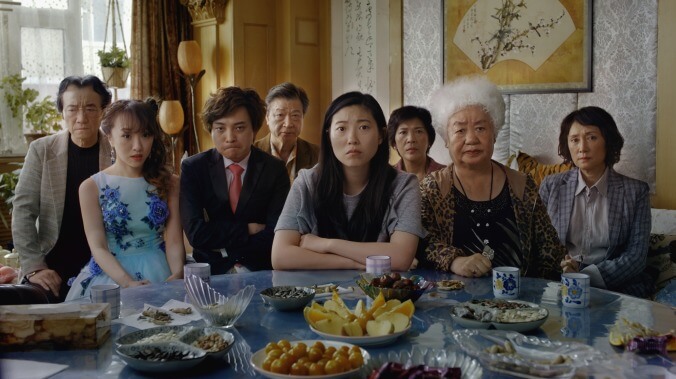Awkwafina wrestles with a true lie in the scattered Sundance favorite The Farewell


If you’ve heard anything about The Farewell other than it stars rapper-turned-actress Awkwafina, maybe it’s the tagline: “Based on a true lie.” The lie in question isn’t a treacherous one, but it is illegal—at least in the States, where it’s expected that if you’re diagnosed with a terminal illness, well, you’ll be hearing about it. But in China, some follow a different protocol, perhaps a more merciful one, in which families carry the emotional burden by simply not telling a dying loved one that they’re dying. It’s an unbelievable practice from a Western point of view, but things aren’t as clear-cut when you’re standing with one foot in your native culture and the other in an adopted one.
Lulu Wang’s sophomore feature captures this tension with tenderness and despair, revisiting the inter-generational family drama—the kind a pre-Hollywood Ang Lee specialized in—through the lens of first generation Chinese-Americans. The Farewell unfolds chiefly from the perspective of Billi (a bare-faced and refreshingly naturalistic Awkwafina), who lives in New York City, as do her parents, Haiyan (Tzi Ma) and Jian (Diana Lin). Like many children of immigrants, Billi has fashioned her own comfortable identity but is pressured to remain in the orbit of her family; she comes home mostly just to do laundry and scarf down homemade dumplings. Though born in China, Billi came to the United States at a young age and hasn’t visited her hometown of Changchun in years. Her Mandarin skills are quite clunky—something even those who don’t speak the language might pick up through the character’s accent, which retains Awkwafina’s throaty East Coast drawl.
While preparing to attend a big wedding in China, Billi learns a secret: Her elderly Nai Nai (or “grandmother”), played by a gloriously vivacious Zhao Shuzhen, has late stage lung cancer and only a few months to live, though no one has told her. As Billi’s parents confess, the wedding is just a ploy to reunite the whole family one last time before her death—a plan that leaves Billi grief-stricken and bewildered. It’s a tweaked version of the autobiographical story Wang told on a 2016 episode of This American Life, reappraising the “lie” in terms of her heroine’s emotional journey. As everyone gathers in Nai Nai’s snug flat, Billi passively observes the mores and personal philosophies of her extended family, all of whom seem more skilled than she is at stifling their feelings. It pains Billi to see her grandmother in such a state of ignorance, but as Nai Nai blissfully, chirpily cobbles together a ceremony for Billi’s cousin and his Japanese girlfriend, revealing the truth becomes more daunting. Eventually, upholding the lie starts to seem like a moral imperative.
A crushingly bittersweet mood dominates the film, and Wang demonstrates a steady hand in her balancing of morbid material and warm, culturally insightful humor, threaded together by a minimal, sentimental score of dulcet vocals and a single violin. Because the filmmaker approaches the story from the perspective of a Chinese-American millennial (essentially a foreigner in China, even though she was born there), she occasionally flirts with trivializing some of the customs that Billi finds befuddling, like a spa treatment that leaves behind gruesome purple welts or Nai Nai’s daily tai-chi routine, which involves slapping her forearms and legs to “increase circulation.” (Implicitly, the ignorance doesn’t stop at the lie.) Outside of the tight, intimate apartment spaces, Wang and cinematographer Anna Franquesa Solano capture a developing Changchun—Wang’s actual family hometown—with the wide-eyed wonder of a visitor, accentuating the place’s unfamiliarity while honing in on its beautiful peculiarity: neon lights, sizzling food carts, enormous cranes hanging over imposing grey buildings.
If there’s a reference point here, it’s the late Taiwanese filmmaker Edward Yang and his masterful career capstone, Yi Yi, which significantly begins with a wedding and ends with a funeral. But though Wang builds empathy (and deploys the color blue) in a way that recalls that great director’s work, she veers too far into maudlin territory in her un-probing affection for the duped Nai Nai and her earnest protector, Billi, whose shifting attitude toward the great lie offers slight character development. Billi’s emotional catharsis—a confessional spat with her frustratingly austere mother following a crawling search for the bride’s missing earring—consequently feels under-developed, and a broader anxiety of dislocation and pent-up familial angst is undermined by cliched childhood callbacks of mis-remembered confusion and fear in the face of change. While the wedding itself is a baiju-fueled tragicomic merry-go-round of tearful speeches and karaoke duets, a literal race to protect Nai Nai from the truth is followed by a final goodbye that feels abrupt, and oddly empty. From a distance, The Farewell can look scattered, a series of ambling vignettes on the tradition-rooted quirks of modern China and the nature of families divided by culture and space. But there are some bright moments of truth, bittersweetly illuminating the grey spaces we create in our expressions of love.